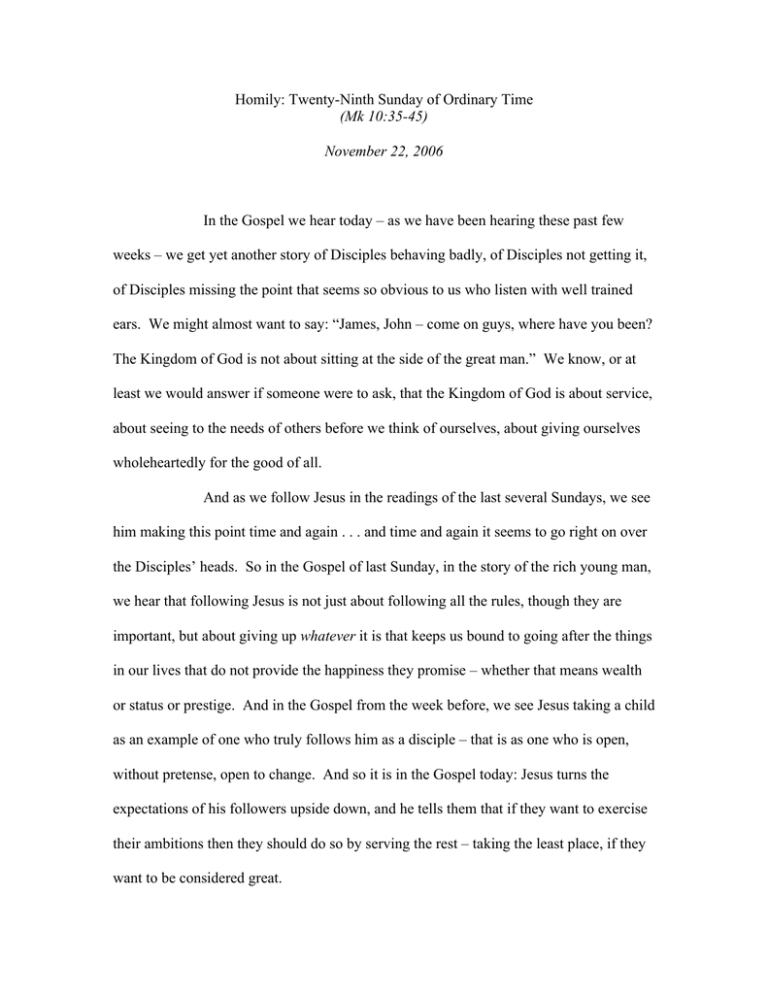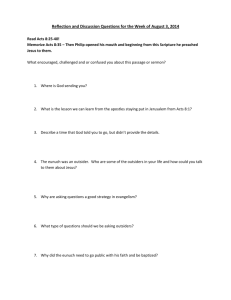Homily: Twenty-Ninth Sunday of Ordinary Time (Mk 10:35-45) November 22, 2006
advertisement

Homily: Twenty-Ninth Sunday of Ordinary Time (Mk 10:35-45) November 22, 2006 In the Gospel we hear today – as we have been hearing these past few weeks – we get yet another story of Disciples behaving badly, of Disciples not getting it, of Disciples missing the point that seems so obvious to us who listen with well trained ears. We might almost want to say: “James, John – come on guys, where have you been? The Kingdom of God is not about sitting at the side of the great man.” We know, or at least we would answer if someone were to ask, that the Kingdom of God is about service, about seeing to the needs of others before we think of ourselves, about giving ourselves wholeheartedly for the good of all. And as we follow Jesus in the readings of the last several Sundays, we see him making this point time and again . . . and time and again it seems to go right on over the Disciples’ heads. So in the Gospel of last Sunday, in the story of the rich young man, we hear that following Jesus is not just about following all the rules, though they are important, but about giving up whatever it is that keeps us bound to going after the things in our lives that do not provide the happiness they promise – whether that means wealth or status or prestige. And in the Gospel from the week before, we see Jesus taking a child as an example of one who truly follows him as a disciple – that is as one who is open, without pretense, open to change. And so it is in the Gospel today: Jesus turns the expectations of his followers upside down, and he tells them that if they want to exercise their ambitions then they should do so by serving the rest – taking the least place, if they want to be considered great. Taken in this way, today’s Gospel is another place where Jesus challenges us to reconsider what it means to be a Christian. To follow after Christ, to enter the Kingdom of God, means in some way giving up the things the World values and tells us are valuable, and embracing the values that Jesus holds and that are the way to true happiness and to real fulfillment. It is worthwhile to hear this message again and again, for no doubt there are parts of our lives that still need to be brought into the light of Gospel values, that still need to be transformed if we are to be free enough to follow after Jesus. But I think it a mistake to only read the story in this way. James and John show us what not to do in asking for a share in the glory, but they are not only two disciples slow on the uptake. If we read ourselves into their place – as we can anywhere in the Gospels where the disciples appear – we can also see how their conversation with Jesus shows us something about how we can approach Jesus. I would focus on three moments. The first is when James and John say: “teacher, we want you to do for us whatever we ask of you.” Okay, that might not be the best way to start a prayer . . . but it is honest. Isn’t that the way we begin most (all?) prayer? We have needs and wants, and we want someone to know them, to recognize us and to answer us. If we do not bring what we want to God – even if what we want is simple or silly or, if we thought about it, not really what we “should” be asking for – if we don’t bring what we want to God, then we are not really bringing ourselves. And if we are not doing that, then we are only really half-ways praying. James and John were not asking for the right thing (the way Matthew tells the story, James and John didn’t even ask Jesus . . . their mother did – and then they really look foolish), but they were asking for what they wanted. As a first step, that is all – I believe – that God wants from us, when we come to him. 2 And how did Jesus react to that honesty? Not by showing up their ambition or wrong headedness, not by shaming them in front of the rest of the Disciples, who probably weren’t all that pleased with them, but by asking in reply: “what do you wish me to do for you?” That is the question Jesus puts to James and John; that is the question he puts to all of us, however we come to God and whatever we end up asking. “What do you wish?” is the question God asks us. Not “what have others taught you to want?” or “what do you think you ought to ask for?” but “what do you wish?” God asks that question because – hard as it may sometimes be to believe – that is actually what God wants so much to give to each of us: what will truly bring us happiness and wholeness, healing and a sense of purpose. Look at all the people in the Gospels who come to Jesus, asking him for something – and even a few who come without asking. Whether they need a cure, or sight, or speech . . . or life, each comes away from their encounter with Jesus with what he or she truly desires: what each needs to give thanks to God and to lead a full life. And lastly, I would look at James and John when they hear Jesus tell them “you do not know what you are asking.” Do you really want give up your desires and plans and take on mine, he asks the two. Are you ready to abandon all those things that give your life security and trust me? If we’re honest – and here I’ll speak only for myself – then I think the answer is: “ um well . . . yes?” But James and John answer: “WE CAN.” “We don’t know what you’re talking about, but we can.” In their words, they show us the risk in asking God for what you truly want; they show us the risk that following Jesus implies; and, I would hold, how it is we are to respond to God’s call to follow him. There is precious little that is certain in life; the same is true in Christian life. 3 We do not know at the beginning what following Christ will mean for us, and the way you do it will be different from the way I do. But however our lives become shaped, we trust ourselves to the promise: if we truly give of ourselves, God will not disappoint. Whatever our mixed desires, whatever are the things we’re not just ready to let go of right now and the uncertainties that are part of every life – when asked: “can you follow after me?” We are able – with the help of God – to respond: “WE CAN.” 4








